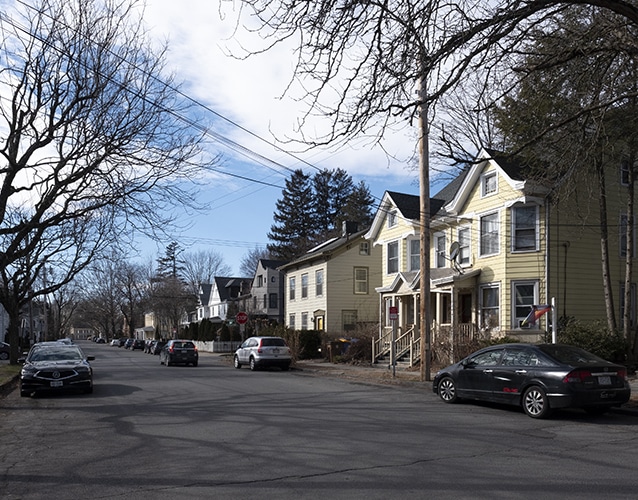It had become unbearable for Troy Mongillo and his girlfriend, Amanda Pabon, to spend time at home. The construction noise was constant, utilities were frequently shut off, and the insulation beneath their apartment was removed just before winter as the new owners of their building in Beacon, New York, renovated the vacant retail space downstairs into a trendy bar. So they decided to move.
But the couple quickly discovered what has become a reality in Beacon and the rest of the Hudson Valley, directly north of New York City: Affordable rentals were hard to come by. They were shocked by how few apartments fell within their budget and how much landlords were demanding of them just to apply.
“I was starting to feel like there’s just no end in sight,” Mongillo said of the weeks they spent searching for a new home. “Things felt really bleak.”
An intensifying housing crisis has gripped New York City and urban areas around the country, fueled by the rising costs of homeownership, surging rents and limited housing stock. Now, some places that were long considered more affordable are contending with those same factors, as well as a pandemic-era influx of new residents and a boom in the number of houses being bought as second homes or listed on short-term rental platforms — putting them increasingly out of reach for renters.
The challenges are acute in parts of the Hudson Valley, where fair market rents (a value calculated annually by the federal Department of Housing and Urban Development to gauge housing markets) have increased by as much as 45% in some places since 2019, according to a report published last year by Hudson Valley Pattern for Progress, a nonprofit group. Rents have risen much faster than wages for many in the region, where lower-income workers have seen their wages stagnate or even decline, according to the report.
Buying a home has become more difficult, driving more people into the rental market, said Adam Bosch, the group’s president and CEO. That has pushed rents “up and up and up,” he said.
Jonathan Bix, the executive director of For the Many, a nonprofit group that has led campaigns calling for state and local housing reform in New York, said that the Hudson Valley “has seen some of the steepest increases in housing costs anywhere in the state over the past several years.”
“People are paying totally unsustainable amounts of their income on housing,” he added.
Faced with an ever-worsening situation and unwilling to wait for lawmakers in Albany to address the crisis in substantial ways, several Hudson Valley communities have tried to take matters into their own hands by making some of the most aggressive changes to housing policy in the state.
In Newburgh, a small city in Orange County where about 70% of people rent their homes, government officials have been fighting the effects of gentrification and a limited housing stock for years. In December, after a city-run study revealed a vacancy rate below 5%, Newburgh became the third municipality in the Hudson Valley and in the state to declare a “housing emergency” and opt into rent stabilization for many older buildings, following Kingston and Nyack. The action has temporarily frozen rent for more than 700 households while officials work on forming a rent guidelines board to vote on annual rent adjustments.
Newburgh, Poughkeepsie and Kingston, as well as Albany, just north of the Hudson Valley, passed “good cause eviction” laws protecting tenants from drastic rent increases and establishing their right to renew their leases. Numerous other cities and towns in the region, including Woodstock, Saugerties and New Paltz, have adopted strict regulations on short-term rentals.
“We’ve been forced to get creative,” said Mike Neppl, a spokesperson for the city of Newburgh. “In the absence of federal policy and in the absence of state policy, local leadership really matters.”
But local officials have faced an uphill battle. Newburgh’s good cause eviction law was struck down in court after landlords sued to stop it, as were those in Kingston and Albany. Neppl said he anticipated landlords would also challenge the city’s rent control measures, as they did in Kingston.
Tackling the state’s housing crisis was one of Gov. Kathy Hochul’s top priorities in 2023, and the governor, a Democrat, proposed ambitious legislation intended to ramp up residential development and protect tenants, but state lawmakers ultimately failed to agree about how to address the issue. The odds of a major housing deal being struck this year are uncertain.
State Sens. Robert Rolison, a Republican, and James Skoufis, a Democrat, who represent the mid-Hudson Valley, said they were optimistic that lawmakers in Albany would manage to take action on the housing crisis this year. They said they wanted to explore ways to reward high-density residential development across the state, and have expressed support for certain tenant protections. Both were hesitant to back statewide good cause eviction legislation.
“Housing is a very sensitive issue. It’s like a Jenga tower — you pull out one block and the whole thing starts to shake,” Skoufis said. “But we have to find a way to thread this needle.”
Many people who recently sought housing in the Hudson Valley said they struggled for weeks or months to find a place to live.
Katie Salmonson, 26, said she and her partner spent more than six months last year searching for a new home in Ulster County, after their landlord told them he was selling the house in Ellenville where they paid $900 per month to live in a first-floor apartment with their son. Every day, Salmonson would check Facebook Marketplace, Zillow and Hotpads, she said. She even drove around looking for “for rent” signs.
“There was just nothing available, whether we could afford it or not,” said Salmonson, who works as a student retention and Title IX coordinator at a community college.
Even though many homes in the area appeared vacant, there were almost no listings, Salmonson said, leading her to wonder whether fewer property owners were choosing to rent to full-time residents.
People have long used Airbnb and other platforms to rent out cozy cottages or off-the-grid cabins in the bucolic region, but locals, government officials and others who study housing in the area said the number of short-term rentals appears to have skyrocketed in recent years. In June 2022, for example, there were 2,587 short-term rentals available in Ulster County, more than anywhere else in the Hudson Valley, according to an audit by the county comptroller, and they made up 12% of the county’s rental stock. In Greene County, such listings accounted for 45% of the rental stock, according to the audit. (An Airbnb spokesperson declined to provide detailed company data about short-term rental listings in the region, but disputed that any increase in listings had significantly affected the availability of affordable housing.)
Salmonson said she and her partner, already living paycheck to paycheck, eventually ran out of options and had to abandon their budget. In the fall, they moved into a small two-bedroom trailer in nearby Accord, where the rent is $2,000 per month, she said.
“I just needed a roof over my kid’s head,” Salmonson said. “It just makes me want to cry.”
c.2024 The New York Times Company. This article originally appeared in The New York Times.







